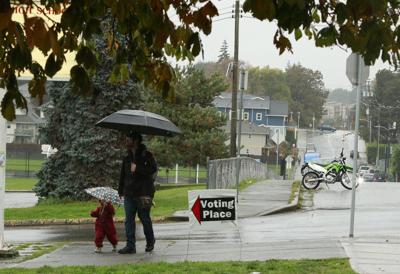VICTORIA - A recent report on British Columbia’s 2024 election found no evidence of foreign interference, but described a “broader culture of skepticism and conspiracy,” saying misinformation and speculation about voting manipulation were “now the norm.”
The report by researchers at the University of É«É«À² and Montreal’s McGill University cites examples including spurious claims that severe rainfall and flooding on election day on Oct. 19 were due to deliberate manipulation of the weather.Â
It said the atmospheric river event was the “centrepiece of a voter suppression narrative” accusing the provincial NDP of using so-called cloud-seeding to suppress turnout for the Conservative Party of B.C., which narrowly lost the election.
The report released by the British Columbia Information Ecosystem Project last month said the “viral spread” of that theory online “underscores the susceptibility of election discourse to misinformation” and the level of mistrust among some voters.
Nearly half of B.C. residents surveyed for the project were unable or unwilling to identify a trusted source of information about provincial elections, leaving them “vulnerable to confusion, distrust and manipulation,” the report said.
UBC political science lecturer Stewart Prest said in an interview that B.C. has always had a polarized political climate.Â
“But it’s taken on a different form now, a kind of marriage of polarized politics with a populist political movement.”Â
He added that this combination had led to a “deep skepticism of government institutions” and while this ran in both directions, “it is particularly pronounced on the right side” of the political spectrum.
“So to some extent, this is the development that we’re seeing across the democratic world, “he said.Â
“There is a subset of the population that no longer trusts broadly in the institutions that govern our societies, and that can lend itself to a much greater willingness to question things like electoral results, even when there is no concrete basis on which to do so.”Â
Nevertheless, the information ecosystem report said Elections BC remains a “highly trusted entity,” with more than 90 per cent of respondents expressing confidence in the agency to conduct a fair election.Â
“Similarly, trust in the integrity of the election results remained high at approximately 80 per cent,” the report said.
However, it also said the “high and steady levels of confidence mask a growing partisan polarization.”Â
While confidence in Elections BC rose by four per cent among NDP supporters surveyed for the project, reaching 93 per cent, it declined by three per cent among Conservative voters, hitting 74 per cent, the report said.
Confidence in Elections BC among supporters of the provincial Green Party meanwhile rose by eight per cent, reaching 90 per cent, it said.
The discovery of a missed ballot box in the riding of Prince George-Mackenzie and yet-to-be proven claims of voting irregularities in Surrey-Guildford became “rallying points for a broader set of fraud claims” that lack credible evidence, the report said.
New Democrat Garry Begg won in Surrey-Guildford by 22 votes, but Conservative candidate Honveer Randhawa has since launched a court challenge alleging voting irregularities.Â
Conservative Leader John Rustad has previously called for an independent inquiry into the election, though the party is not directly participating in Randhawa’s case.Â
B.C.‘s chief electoral officer, Anton Boegman, has said the election took place in a “much more challenging” information environment than previous votes, even as he acknowledged mistakes that he said did not affect the overall outcome.Â
The report released Aug. 29 attributes partisan polarization to what it called a “fragmented” information system where political communication is largely confined to “distinct ideological clusters” and there is little crossover among groups.Â
The report also outlined how B.C.‘s political parties dominated the discourse on different platforms during the election that delivered the NDP a one-seat majority.
Both the New Democrats and Greens drew attention on Instagram, while X, formerly known as Twitter, “appears to have served as a key vector” for the Conservatives’ digital campaign, the report said.
It said X in particular “amplifies misinformation and disinformation risks” because of what it describes as the platform’s “outsized role” in shaping narratives.Â
But the report also warned against reading too much into social media, as conversations on social media often misrepresent broader public sentiment.
This report by The Canadian Press was first published September 10, 2025.Â
Error! Sorry, there was an error processing your request.
There was a problem with the recaptcha. Please try again.
You may unsubscribe at any time. By signing up, you agree to our and . This site is protected by reCAPTCHA and the Google and apply.
Want more of the latest from us? Sign up for more at our newsletter page.



















To join the conversation set a first and last name in your user profile.
Sign in or register for free to join the Conversation